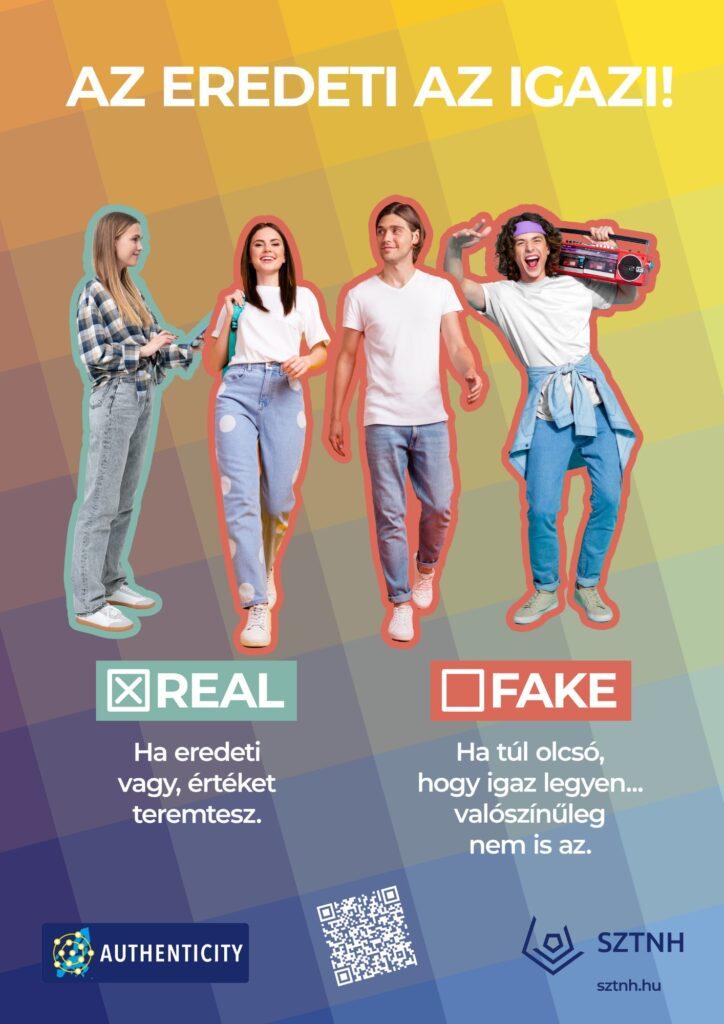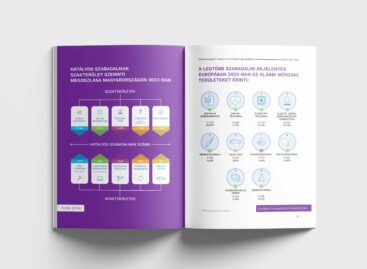High school students are being taught about the risks of counterfeiting
Last year, our country joined the ‘Authenticities’ project launched by the European Union Intellectual Property Office (EUIPO) with the city of Pécs, which builds on the power of individuals and local communities in the fight against counterfeiting and in order to make the enforcement of intellectual property rights more effective. As part of the project implemented by the Hungarian Intellectual Property Office (HIO) with the involvement of the local government, two high school education courses will be implemented this year for students in Pécs, and – based on these – a student campaign called The original is the real one! has been launched. The campaign aims to raise the awareness of high school students about why it is dangerous to buy counterfeit products and why it is important to protect intellectual property – whether it is music, clothing, design or infringements involving various technologies.
 21 European cities have joined the Authenticity initiative so far – including major cities such as Paris, Rome and Madrid. This also shows that the fight against counterfeiting can only be truly effective if national and European-level policy efforts are accompanied by local community actions. The key to success is that, in addition to national offices and law enforcement authorities, local governments, local businesses and educational institutions also join forces for a common goal.
21 European cities have joined the Authenticity initiative so far – including major cities such as Paris, Rome and Madrid. This also shows that the fight against counterfeiting can only be truly effective if national and European-level policy efforts are accompanied by local community actions. The key to success is that, in addition to national offices and law enforcement authorities, local governments, local businesses and educational institutions also join forces for a common goal.
Pécs is the first Hungarian city to join the so-called ‘European Network of Authentic Cities’, which is organized by the cities participating in the project. Focusing on regional intellectual property values and creative knowledge, the city and its region have been focusing on the protection of intellectual property and the importance of the fight against counterfeiting during the two years of the project. The project focuses not only on sensitizing the acting local authorities and the professionals of the higher education institutions that train the professionals of the future, but also considers the early education of the younger generations to be important.
To this end, the SZTNH is holding interactive, awareness-raising training courses for about 60-70 high school students in Pécs, including topics such as copyrights related to filmmaking, logos and trademarks, and pharmaceutical counterfeiting. The special feature of the training is that a visit to a location in Pécs related to the topics is also part of the program, where experts from Pécs will complement the presentations by SZTNH experts. The first training course also marks the opening of an online educational campaign titled The Original is the Real!, which focuses on young people: the project not only helps high school students learn about the risks of counterfeiting and IP infringements with interactive training courses, but also introduces students to the concepts and dangers of individual segments of IP and counterfeiting through playful, visually appealing and short content, and sets them on the path to more conscious consumer thinking.
Counterfeit and pirated goods cost key sectors of the EU economy more than €83 billion a year and cost 670,000 jobs. The problem also costs EU governments up to €15 billion in lost public revenue each year. Counterfeit products not only cause economic damage, but also pose serious health and safety risks: everything from clothing and cosmetics from uncontrolled sources to medicines, protective equipment and food, to children’s toys, can be counterfeit. Cheap, “too good to be true” offers often finance criminal organisations and are linked to other serious crimes such as money laundering, cybercrime and even human trafficking.
The fight against counterfeiting is not only the task of law enforcement authorities, but the diversity of threats also requires increased consumer attention – which is why awareness-raising cannot start early enough in order to better alert future consumers and rights holders to the threats.
Related news
Not a marginal phenomenon: counterfeiting has become a systemic problem in Hungary
🎧 Hallgasd a cikket: Lejátszás Szünet Folytatás Leállítás Nyelv: Auto…
Read more >Counterfeit food: a serious health and economic risk
🎧 Hallgasd a cikket: Lejátszás Szünet Folytatás Leállítás Nyelv: Auto…
Read more >The new publication of the Hungarian Institute of Industrial Economics, supporting SMEs, focuses on the circular economy
🎧 Hallgasd a cikket: Lejátszás Szünet Folytatás Leállítás Nyelv: Auto…
Read more >








